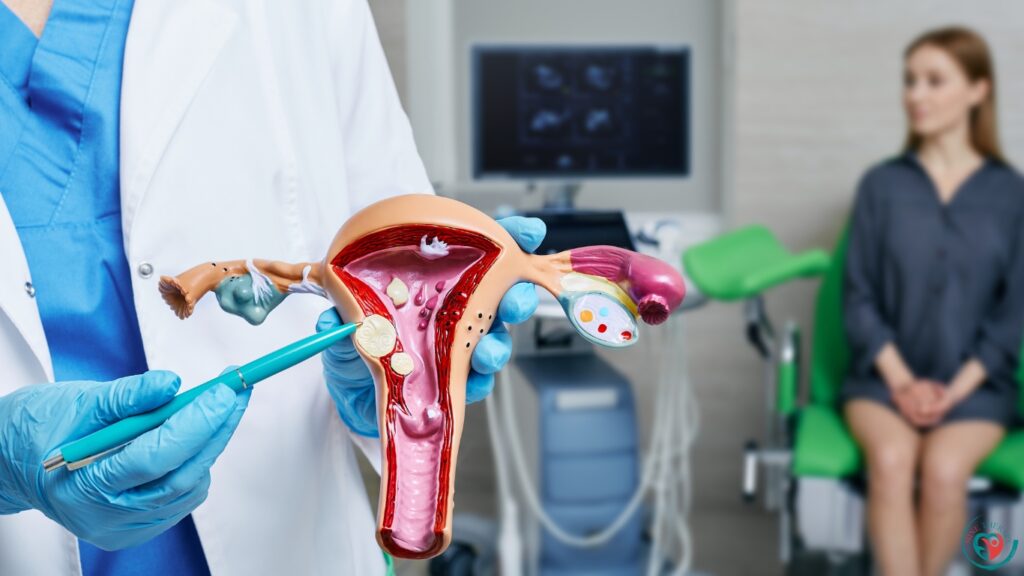Welcome to our blog on Mercier Therapy, a comprehensive method for improving fertility and pelvic health. Dr. Jennifer Mercier created this simple yet powerful therapy to help women with infertility, pelvic discomfort, and dysfunction. Mercier Therapy uses manual manipulation techniques to improve blood flow and pelvic organ mobility, hence improving overall reproductive well-being.
Table of Contents
Explore the fundamentals, advantages, and firsthand accounts of Mercier treatment which guides a healthy and naturally occurring route to conception and pelvic health.
What is Mercier Therapy?
A specific type of manual therapy called Mercier treatment is intended to help women with issues related to their pelvic health. This gentle, hands-on therapy was developed by licensed naturopathic physician and holistic healer Dr. Jennifer Mercier. Its goal is to improve the function and movement of the pelvic organs.
Enhancing pelvic blood flow, reestablishing optimal organ alignment, and releasing adhesions or constraints that could aggravate pelvic pain, dysfunction, or infertility are the main objectives of Therapy. Therapists seek to facilitate healing and alleviate tension in the pelvic area by the application of precision and targeted manual manipulation.
Women experiencing a variety of pelvic health conditions, such as endometriosis, fibroids, pelvic adhesions, irregular menstruation, and infertility, frequently seek out Mercier treatment. Women who have had pelvic procedures or who have suffered injuries to the pelvic region will find it especially helpful.
Conditions Addressed By Mercier Therapy
A thorough method called Mercier Therapy can help women with a range of pelvic health issues. The goal of Mercier treatment is to restore balance, mobility, and function to the pelvic organs through the use of gentle and precise manual manipulation techniques. The following are some typical ailments that Mercier treatment can treat:
Mercier Therapy reduces inflammation and improves pelvic blood flow, which can help relieve the symptoms of endometriosis, including pelvic discomfort, heavy periods, and infertility.
Pelvic Pain:
Mercier treatment significantly reduces pelvic pain and discomfort by releasing tension and restoring appropriate alignment of the pelvic organs, regardless of the cause, including adhesions and muscle tension.
Infertility:
By increasing pelvic blood flow, decreasing scar tissue, and fostering general pelvic health, Mercier treatment has demonstrated encouraging effects in raising fertility. For women who are experiencing infertility that cannot be explained or fertility problems because of pelvic adhesions or dysfunction, it may be helpful.
Fibroids:
By enhancing circulation and easing tension in the pelvic region, Mercier treatment can help control the symptoms of uterine fibroids, including heavy menstrual bleeding and pelvic pressure.

Menstrual irregularities:
Mercier treatment may help regulate menstrual cycles and relieve symptoms of irregular menstruation, such as excessive bleeding or irregular periods, by encouraging hormonal balance and enhancing pelvic circulation.
Adhesions:
By dissolving pelvic adhesions, which may be the consequence of infections, surgeries, or inflammatory diseases, Mercier treatment helps to relieve pain and restore normal pelvic function.
Benefits of Mercier Therapy For Pelvic Health
Mercier Therapy is a useful modality for women looking for natural and efficient treatments for pelvic concerns because it provides a number of benefits for pelvic health. The following are some main advantages:
Discomfort Relief:
Mercier treatment is a valuable treatment option for pelvic discomfort brought on by endometriosis, fibroids, pelvic adhesions, and menstrual disorders. Mercier Therapy relieves pain and enhances general health by lowering inflammation, relaxing tension, and increasing blood flow to the pelvic organs.
Enhanced Fertility:
Mercier Therapy has helped a lot of ladies who are having trouble becoming pregnant. For couples attempting to conceive naturally or with the use of assisted reproductive technologies, Mercier treatment can enhance fertility results and increase the odds of pregnancy by optimizing organ function, decreasing scar tissue, and improving pelvic blood flow.
Hormonal Balance:
By encouraging normal pelvic organ function and circulation, Mercier treatment helps to reestablish hormonal balance. This can enhance general reproductive health, lessen symptoms of hormone abnormalities, and control menstrual cycles.
Enhanced Pelvic Mobility:
Mercier Therapy attempts to improve the pelvic organs’ alignment and mobility by using mild manual manipulation techniques. This can assist in preventing or treating pelvic dysfunction, which includes weak pelvic floor muscles, prolapsed pelvic organs, and urine incontinence.
Non-Invasive and Gentle:
Because Mercier treatment is gentle and non-invasive, it can be used by women with a variety of medical conditions and ages. Mercier Therapy provides a natural approach to pelvic health without the risks or side effects of invasive procedures, in contrast to surgical interventions or pharmacological treatments.
What To Expect During a Mercier Therapy Session?
Clients may anticipate a compassionate and individualized approach to pelvic health and wellness during a Mercier Therapy session. Sessions are usually held in a cozy, private setting, with the therapist’s main goal being to provide the client with a secure and encouraging environment.
An extensive evaluation of the client’s medical background, pelvic health issues, and treatment objectives takes place at the start of the session. This enables the therapist to ensure a customized treatment plan and customize the session to the client’s specific needs.

The client will recline comfortably on a massage table during the actual therapy session, and the therapist will use mild manual manipulation techniques to alleviate tension, adhesions, and pelvic limitations. To enhance circulation, encourage healing, and restore pelvic function, these techniques may include light pressure, stretching, and mobilization of the pelvic organs.
The therapist will check in with the client during the session to make sure they are comfortable and to answer any questions or concerns that may come up. To get the best outcomes, it could be advised to schedule many sessions, depending on the client’s needs and goals.
Is Mercier Therapy suitable for postpartum women?
Mercier therapy is a valuable tool for helping postpartum women adjust to the physical changes and obstacles that come with giving birth. The pelvic organs, muscles, and connective tissues change significantly throughout pregnancy and childbirth in order to provide room for the development therapy baby and to aid in delivery. These alterations may occasionally result in problems such as postpartum hormone imbalances, pelvic discomfort, pelvic floor dysfunction, or the creation of scar tissue.
Mercier Therapy provides a gentle and comprehensive method of treating these postpartum pelvic difficulties. Mercier employs manual manipulation techniques to alleviate tension, enhance circulation, and reestablish pelvic organ and tissue movement. This can lessen the creation of scar tissue from childbirth, ease postpartum discomfort, and improve pelvic well-being in general.
Furthermore, by addressing problems like pelvic floor weakness, urine incontinence, or pelvic organ prolapse—all of which are frequent concerns for many women after childbirth—Mercier Therapy can aid in the postpartum recovery process. Postpartum women must, however, speak with a licensed Mercier therapist to make sure the treatment is safe and appropriate for their unique postpartum health situation and is customized to meet their requirements.
Mercier Therapy Side Effects
With few documented adverse effects, Mercier treatment is typically regarded as a mild and safe treatment option for pelvic health conditions. As with any therapy approach, there are some drawbacks and things to keep in mind.
Temporary Discomfort:
If there are adhesions or areas of tension in the pelvic region, some people may feel slight discomfort during or after a Mercier Therapy session. Typically, this discomfort is very momentary and will go away as the body becomes used to the medication.

Spotting or Light Bleeding:
After a Mercier Therapy session, some women may experience spotting or light bleeding. Increased blood flow to the pelvic organs or the release of pent-up stress may cause this. But this is usually a passing phenomenon and not a reason for alarm.
Emotional Release:
When stress and tension are relieved from the pelvic region, Mercier treatment may occasionally provide emotional release. During or following a session, clients may feel vulnerable, depressed, or angry. Although releasing emotions can be therapeutic, it’s important for clients to be ready for these possible emotions and to have backup plans ready in case they need them.
Exhaustion or Lightheadedness:
After a Mercier Therapy session, some people may experience fatigue or lightheadedness, particularly if they have been carrying tension in the pelvic area for a long time. After a session, it’s critical to assist the body’s healing process with rest and fluids.
Conclusion
Finally, Mercier Therapy provides a mild yet effective treatment for women’s pelvic health and fertility problems. Mercier treatment focuses on manual manipulation techniques with the goal of reducing pelvic pain, enhancing natural reproductive results, and improving organ function. Mercier treatment offers women looking for alternative treatments to pelvic health issues a promising route because of its holistic approach and low side effects. Accepting this therapy can help women take charge of their journey toward bettering their general health and pelvic well-being.
FAQs
Q: Which conditions is Mercier Therapy effective for?
A: Numerous pelvic health concerns, such as endometriosis, pelvic discomfort, fibroids, irregular menstruation, and pelvic adhesions, can be treated with Mercier treatment.
Q: What is the usual number of Mercier Therapy sessions required?
A: The number of sessions varies based on the needs and objectives of each individual. To attain the best outcomes, however, customers frequently gain from a sequence of 6–8 sessions spread out over a few weeks.
Q: Is Mercier Therapy appropriate for all individuals?
A: Regardless of age or health status, Mercier Therapy is generally safe and appropriate for the majority of women. Nevertheless, in order to ascertain whether this is the best course of action for you, particularly if you have certain health issues or concerns, you must speak with a licensed Mercier therapist.
Q: Does Mercier Therapy enhance the success of conception?
A: Yes, by increasing pelvic blood flow, minimizing scar tissue, and maximizing organ function, Mercier Therapy has demonstrated encouraging benefits in boosting fertility. Numerous women have stated that receiving Mercier Therapy enhanced their chances of getting pregnant.
Q: Do Mercier Therapy side effects exist?
A: Although Mercier Therapy is usually well tolerated, following a session, some people may experience short-term soreness, spotting, emotional release, or exhaustion. Usually minor and temporary, these adverse effects go away as the body gets used to the medication.
